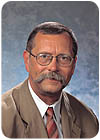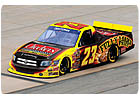Pedal to the Metal

Bill Zauld
Move over, NFL. Get out of the way, MLB. Forget about it, NBA. It’s NASCAR that, without a doubt, is the top live spectator sport, boasting 17 of the top 20 attended events in the country. NASCAR annually grabs more than 75 million fans, according to marketing research firm Ipsos Insight. On television, stock car racing is second only to pro football.
The biggest events also tend to be the biggest targets for threats ranging from pick-pocketing and unauthorized visitors to unruly crowds and terrorist attacks.
So meet Tim Christine, director of security for NASCAR.
Formerly with the Secret Service, Christine has, at first blush, the “to-die-for” job; but, in a telephone interview with him recently, he discussed the vast challenges of the position – a number of NASCAR facilities needing access controls, a constantly movable credentialing assignment, partnering with various track owners with their own minds and businesses and even the need to apply security technologies to enforce NASCAR safety and racing rules.
Earlier this year, NASCAR gained a powerful ally when it named Ingersoll Rand Security Technologies, Carmel, Ind., as an official partner of the National Association of Stock Car Auto Racing for security solutions and products. As part of a four-year partnership, the two enterprises will collaborate to develop security best practices and explore security systems unique to the specific needs of NASCAR-owned facilities as well as speedways that host NASCAR-sanctioned races, and race team operations across North America, according to Dave Sylvester, president, Americas, Ingersoll Rand Security Technologies.
No surprise; Sylvester feels he’s got the checkered flag in the deal. “With millions of fans, partners and employees attending NASCAR races throughout the year, NASCAR appreciates the value and critical importance of delivering a safe and secure experience for everyone. We look forward to helping NASCAR further refine and evolve overall security practices and capabilities.”

Future security plans include use of leading-edge technology to track certain types of race gear to ensure NASCAR rules are followed.
Security is not the only connection of IR to NASCAR.
The company’s air guns are in the hands of many pit crews. And it was the sponsor of a Dodge Charger on NASCAR’s Busch circuit.
In some ways, it is the big crowds that are a prime focus for Christine. “On any given weekend, we might have 150,000 spectators in the grandstand.” With such crowds in addition to support and service personnel, plans must keep everyone safe and secure. And we have to be prepared for any contingencies, Christine added.
As with a growing number of venues, NASCAR event security screens people for contraband and has even higher-level perimeter protection as people get closer to the pit and sensitive racing officials’ areas. But unlike all other sports, pointed out Christine, NASCAR security must work and communicate with scores of speedway officials, local security and law enforcements officers and the occasional homeland security executive at numerous tracks throughout North America.
Also different, NASCAR events at a given speedway can run three to four days as compared to the two or three hours baseball game.
Security starts with the basic hardware – steel doors and frames – and includes security video cameras for the entire facility, from the outer parking lots to the sometimes chaotic infield; electronic access and biometric systems and time and attendance monitoring of employees. “There are safeguards built in for any large-scale public gathering of any sport,” Christine said. “That includes contingency plans, whether for a natural disaster, such as tornadoes, or a terrorist attack. We have to be prepared at any given time to evacuate, and that calls for having well-rehearsed plans.”
Christine also enforces a set of NASCAR security requirements at all facilities that are awarded a sanctioned event.
In addition, and while Christine said that has been no specific intelligence aimed at NASCAR events, the FBI is involved and gives him intelligence estimates.
Looking for a reprint of this article?
From high-res PDFs to custom plaques, order your copy today!




